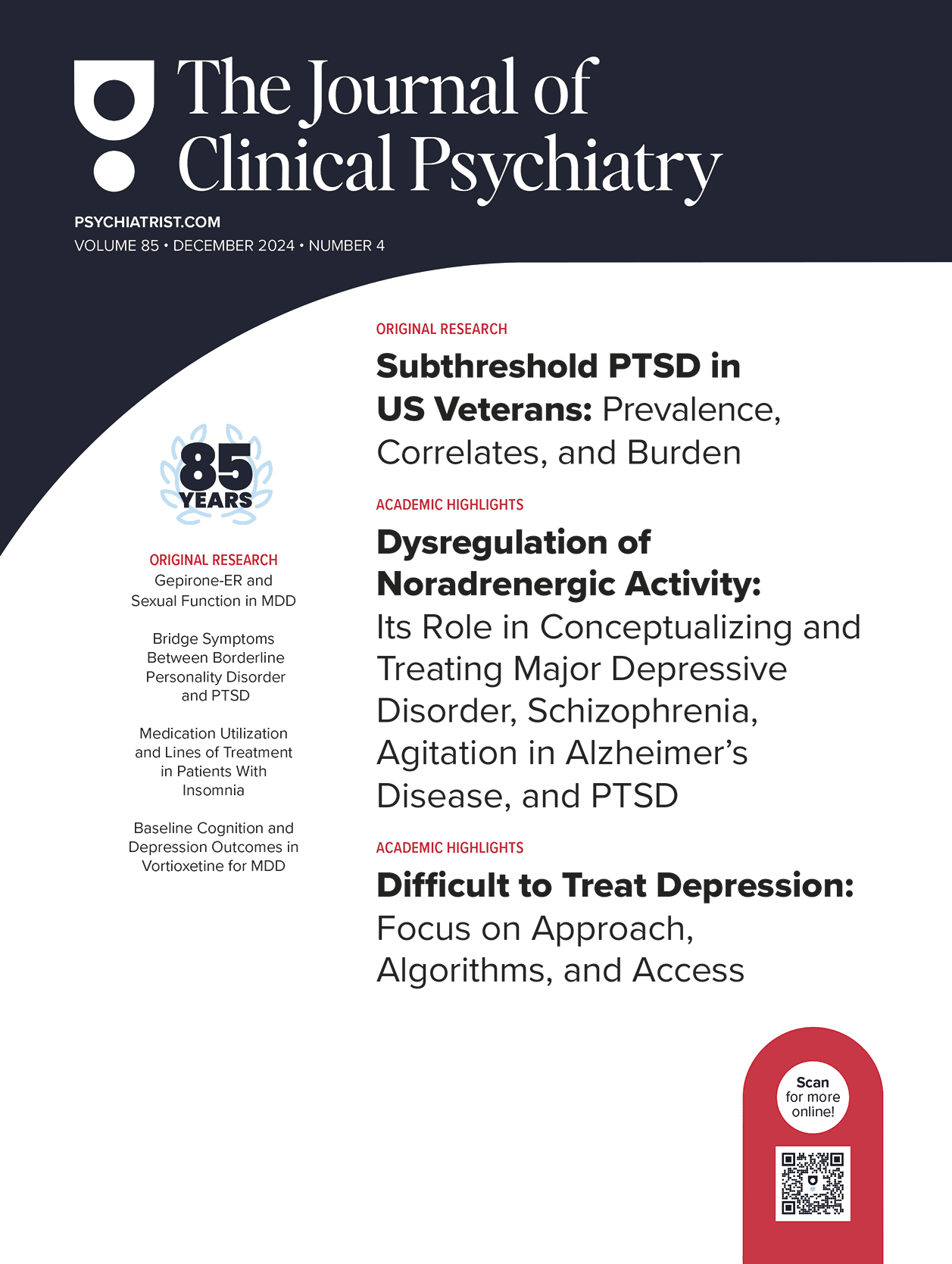Because this piece does not have an abstract, we have provided for your benefit the first 3 sentences of the full text.
To the Editor: Interest and enthusiasm for research on the immunology of schizophrenia has, arguably, taken a prominent role in the field. Adjunctive antiinflammatory treatment may be associated with improvement in psychopathology and cognition in some patients with schizophrenia. Interleukin-6 (IL-6) is an inflammatory cytokine produced by blood leukocytes and central nervous system microglia and astrocytes.
This work may not be copied, distributed, displayed, published, reproduced, transmitted, modified, posted, sold, licensed, or used for commercial purposes. By downloading this file, you are agreeing to the publisher’s Terms & Conditions.
An Open-Label, Pilot Trial of Adjunctive Tocilizumab in Schizophrenia
To the Editor: Interest and enthusiasm for research on the immunology of schizophrenia has, arguably, taken a prominent role in the field. Adjunctive antiinflammatory treatment may be associated with improvement in psychopathology and cognition in some patients with schizophrenia.1,2 Interleukin-6 (IL-6) is an inflammatory cytokine produced by blood leukocytes and central nervous system microglia and astrocytes. IL-6 levels are elevated and associated with psychopathology, smaller hippocampal volume, and poorer cognition in schizophrenia.3-5 We hypothesized that adjunctive tocilizumab—a humanized IL-6 receptor monoclonal antibody—would improve cognition in schizophrenia, an important determinant of quality of life and functioning.
Method. With Institutional Review Board approval and an Investigational New Drug waiver from the US Food and Drug Administration (FDA), we conducted an 8-week open-label trial of adjunctive tocilizumab in schizophrenia (ClinicalTrials.gov Identifier NCT01696929). All subjects provided written informed consent, and a Data Safety Monitoring Board, which included a psychiatrist and rheumatologist, provided study oversight.
Tocilizumab is FDA approved for adults with rheumatoid arthritis and juvenile idiopathic arthritis and is administered as an intravenous infusion every 4 weeks. Subjects were aged 18-55 years, had a DSM-IV diagnosis of schizophrenia or schizoaffective disorder, were taking a non-clozapine antipsychotic, had no psychiatric hospitalizations in the past 3 months, and were on stable psychotropic medications for ≥ 1 month.
Exclusion criteria were taking scheduled immunomodulatory agents; having a history of immune disorder; using an illicit drug in the past month; having unstable medical conditions; having active or chronic infections; and being pregnant, breastfeeding, or being a reproductive-age female not using contraception.
After screening, subjects received 4 mg/kg of tocilizumab at baseline and 4 weeks. Psychopathology (Positive and Negative Syndrome Scale6 [PANSS], cognition (Brief Assessment of Cognition in Schizophrenia7 [BACS], alternate forms of testing) and fasting serum high-sensitivity C-reactive protein (hsCRP) and cytokine levels were assessed at baseline and weeks 2, 4, and 8. Changes in psychopathology and cognition were analyzed using a paired t test, 2-sided, using a last-observation carried forward approach; P values were considered statistically significant at the α = .05 level.
Results. Eight subjects were enrolled; 2 were excluded after screening. Although 6 subjects entered the trial, 1 was removed after the first infusion because psychosocial stressors required psychiatric hospitalization. All week-4 study assessments were completed by the subject; however, a second infusion was not administered. Thus, 5 subjects completed the trial. Demographic and clinical characteristics are presented in Table 1. Infusions were well tolerated without clinically significant adverse effects. Compared to baseline, there was significant improvement in BACS verbal fluency at 4 weeks; digit symbol coding at 2, 4, and 8 weeks; and composite score at 4 and 8 weeks (see Table 1). There were no significant changes in psychopathology scores or hsCRP or cytokine levels, and baseline immune measures did not predict changes in cognition. The most likely explanations for these negative associations are the small sample size and that 5 of 6 subjects did not have detectable baseline IL-6 levels. Since tocilizumab is an IL-6 receptor antagonist, IL-6 levels increased from baseline (4 of 6 subjects had detectable IL-6 levels after infusions), most likely reflecting endogenous IL-6 production.
Adjunctive tocilizumab was associated with significant improvement in cognition. Improvements were observed in all 6 subjects for digit symbol coding, which were robust in magnitude,8-10 and in 5 subjects for global cognition. Digit symbol coding is a measure of processing speed not associated with specific brain regions or functional neurocircuitry,11 and greater impairments predict poorer prognosis and functional disability.12 Our findings suggest that tocilizumab may be a viable adjunctive treatment for cognitive impairment in schizophrenia, although safety and cost (approximately $1,000 per 4 mg/kg dose) are important considerations regarding its clinical utility. Given the serious potential adverse effects due to immunosuppression, which include life-threatening infections, ulcers, and malignancy, use of this medication required a formal risk evaluation and mitigation strategy. An important strength of our study is that, unlike nonsteroidal antiinflammatories, tocilizumab has no relevant off-target (ie, non-immune system) effects. Potential limitations are the open-label design and possible practice effects, although we used alternate forms of the BACS.13 Tocilizumab was not associated with improvements in psychopathology; however, subjects were clinically stable with mild baseline illness severity. In rheumatoid arthritis, tocilizumab dosing is increased to 8 mg/kg after the first infusion. Because subjects received 4 mg/kg for both infusions, improvements may have plateaued. Evidence of baseline inflammation was not an inclusion criterion, although it was present for 3 of 6 subjects (hsCRP ≥ 3 mg/dL). In depression, monoclonal antibody therapy with infliximab may improve symptoms in patients with baseline inflammation.14 A larger "proof-of-concept" randomized, placebo-controlled trial of patients with a higher dose of tocilizumab and for a longer duration is warranted. Including only subjects with baseline inflammation may increase the signal-to-noise ratio and would be a step toward more personalized medicine for patients with schizophrenia.
References
1. Nitta M, Kishimoto T, Müller N, et al. Adjunctive use of nonsteroidal anti-inflammatory drugs for schizophrenia: a meta-analytic investigation of randomized controlled trials. Schizophr Bull. 2013;39(6):1230-1241. PubMed doi:10.1093/schbul/sbt070
2. Müller N, Riedel M, Schwarz MJ, et al. Clinical effects of COX-2 inhibitors on cognition in schizophrenia. Eur Arch Psychiatry Clin Neurosci. 2005;255(2):149-151. PubMed doi:10.1007/s00406-004-0548-4
3. Miller BJ, Buckley P, Seabolt W, et al. Meta-analysis of cytokine alterations in schizophrenia: clinical status and antipsychotic effects. Biol Psychiatry. 2011;70(7):663-671. PubMed doi:10.1016/j.biopsych.2011.04.013
4. Mondelli V, Cattaneo A, Belvederi Murri M, et al. Stress and inflammation reduce brain-derived neurotrophic factor expression in first-episode psychosis: a pathway to smaller hippocampal volume. J Clin Psychiatry. 2011;72(12):1677-1684. PubMed doi:10.4088/JCP.10m06745
5. Miller B, Mellor A, Buckley PF. Interleukin-6 and cognition in non-affective psychosis. Schizophr Bull. 2013;39:S242-S243.
6. Kay SR, Fiszbein A, Opler LA. The Positive and Negative Syndrome Scale (PANSS) for schizophrenia. Schizophr Bull. 1987;13(2):261-276. PubMed doi:10.1093/schbul/13.2.261
7. Keefe RS, Goldberg TE, Harvey PD, et al. The Brief Assessment of Cognition in Schizophrenia: reliability, sensitivity, and comparison with a standard neurocognitive battery. Schizophr Res. 2004;68(2-3):283-297. PubMed doi:10.1016/j.schres.2003.09.011
8. Sumiyoshi T, Park S, Jayathilake K, et al. Effect of buspirone, a serotonin1A partial agonist, on cognitive function in schizophrenia: a randomized, double-blind, placebo-controlled study. Schizophr Res. 2007;95(1-3):158-168. PubMed doi:10.1016/j.schres.2007.06.008
9. Lee SW, Lee JG, Lee BJ, et al. A 12-week, double-blind, placebo-controlled trial of galantamine adjunctive treatment to conventional antipsychotics for the cognitive impairments in chronic schizophrenia. Int Clin Psychopharmacol. 2007;22(2):63-68. PubMed doi:10.1097/YIC.0b013e3280117feb
10. Meltzer HY, Bobo WV, Roy A, et al. A randomized, double-blind comparison of clozapine and high-dose olanzapine in treatment-resistant patients with schizophrenia. J Clin Psychiatry. 2008;69(2):274-285. PubMed doi:10.4088/JCP.v69n0214
11. Dickinson D. Digit symbol coding and general cognitive ability in schizophrenia: worth another look? Br J Psychiatry. 2008;193(5):354-356. PubMed doi:10.1192/bjp.bp.108.049387
12. Dickinson D, Ramsey ME, Gold JM. Overlooking the obvious: a meta-analytic comparison of digit symbol coding tasks and other cognitive measures in schizophrenia. Arch Gen Psychiatry. 2007;64(5):532-542. PubMed doi:10.1001/archpsyc.64.5.532
13. Keefe RS, Harvey PD, Goldberg TE, et al. Norms and standardization of the Brief Assessment of Cognition in Schizophrenia (BACS). Schizophr Res. 2008;102(1-3):108-115. PubMed doi:10.1016/j.schres.2008.03.024
14. Raison CL, Rutherford RE, Woolwine BJ, et al. A randomized controlled trial of the tumor necrosis factor antagonist infliximab for treatment-resistant depression: the role of baseline inflammatory biomarkers. JAMA Psychiatry. 2013;70(1):31-41. PubMed doi:10.1001/2013.jamapsychiatry.4
aDepartment of Psychiatry and Health Behavior; bDepartment of Biostatistics and Epidemiology; cCancer Immunology, Inflammation and Tolerance Program, Cancer Center; and dMedical College of Georgia, Georgia Regents University, Augusta
Author contributions: Dr Miller designed the study. Dr Dias performed the statistical analyses. Dr Lemos performed the cytokine assays. Drs Miller and Buckley wrote the first draft of the manuscript. All authors contributed to and have approved the final manuscript.
Potential conflicts of interest: Dr Miller received grant support for this study from the American Psychiatric Association. In the past 12 months, Dr Miller has received grant support from the National Institute of Mental Health (1K23MH098014-01); research support from the National Institutes of Health Clinical Loan Repayment Program and Georgia Regents University; honoraria from Psychiatric Times; and speaker fees for lectures from the University of Nevada, Reno, and Emory University, Atlanta, Georgia. Dr Lemos was supported by a postdoctoral research fellowship from the JDRF (grant No. 3-2013-219). Dr Buckley received grant support for this study from the American Psychiatric Association and grant/research support from the National Institute of Mental Health, Janssen Pharmaceutica, Pfizer, and Sunovion and is a consultant (honorarium/expenses) for the National Institute of Mental Health. Dr Dias has nothing to disclose.
Funding/support: Funding for this study was provided in part by the American Psychiatric Association (APA) Kempf Fund Award for Research Development in Psychobiological Psychiatry (Drs Buckley and Miller).
Role of the sponsor: The APA had no further role in study design; in the collection, analysis, and interpretation of data; in the writing of the research letter; and in the decision to submit the research letter for publication.
Previous presentations: A subset of the data from this research letter was presented at the Schizophrenia International Research Society biennial meeting; April 5-9, 2014; Florence, Italy; and the Society of Biological Psychiatry annual meeting; May 8-10, 2014; New York, New York.
Acknowledgment: The authors wish to thank Niju Philip, MS, of Georgia Regents University, Augusta, for assistance with data collection and management. Mr Philip has no conflicts to disclose.
J Clin Psychiatry 2016;77(2):275−276
dx.doi.org/10.4088/JCP.15l09920
© Copyright 2016 Physicians Postgraduate Press, Inc.
This PDF is free for all visitors!
Save
Cite





